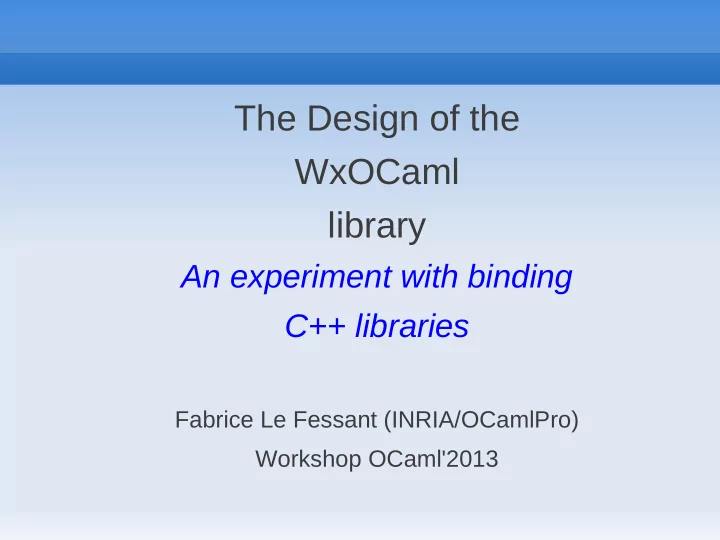

The Design of the WxOCaml library An experiment with binding C++ libraries Fabrice Le Fessant (INRIA/OCamlPro) Workshop OCaml'2013
A new GUI Toolkit How to write GUIs in OCaml ? LablTK ? Pros: included in the distrib Cons: bad look and feel, few widgets LablGTK ? Pros: well tested, interface builder Cons: no win64, not native on Win & MacOS HTML5 ? Pros: js_of_ocaml good, lots of JS libraries Cons: webapp + http server, debug hard No Interface ? Curses ? Other ones ?
Idea: binding for WxWidgets Good multi-platform support: GTK under Linux, native on Windows and Mac OS But the dev has been very slow in the last years :-( With bindings for MANY languages... Very famous Python bindings Also wxHaskell, wxEiffel, etc. Except OCaml... Not completely true : wxCaml, not finished
1st try: finishing WxCaml Going from OCaml to C++: Use camlidl to generate stubs between C and OCaml from a ”wxc.idl” file C++ ↔ C stubs manually written (”elj” library) Problems: Mostly untyped: C stub arguments are not correctly typed All widget types are equivalent ! WxCaml forked ”wxc.idl” and ”elj” to solve these problems, but they come from wxHaskell... that forked them from wxEiffel... unmaintainable !
2nd try: Goals Easy to maintain/extend: No dependency towards wxHaskell or wxEiffel Easily accessible by beginners: No fancy types: no Classes/Objects, no Polymorphic Variants, no GADT, no labels/optional arguments (for now...) Should be usable from the first OCaml lesson ! Error messages for those are too complex to read OO makes code unreadable with meth overloading Build a more abstract layer afterwards ! But write a few applications first...
Hello World
Hello World
A DSL to generate stubs Describes the C++ hierarchy of classes and their methods class wxTimer inherit wxEvtHandler begin new Create (wxEvtHandler *owner, int id =-1 ) wxEvtHandler *GetOwner () const void SetOwner (wxEvtHandler *owner, int id=-1) bool Start (int milliseconds=-1, bool oneShot=false) version 2.9 begin bool IsOneShot () const void Notify () end end
For Each C++ class Two OCaml types: type wxTimer_class : the C++ object type wxTimer = wxTimer_class wx : OCaml value A module ”WxTimer” with: ALL its methods (including ancestors methods !) ”o->meth(x,y,z)” becomes ”WxTimer.meth o x y z” Safe coercions (identity) to all ancestors An ”Unsafe” sub-module, with coercions to all descendants (with runtime test)
Generated OCaml Code For module WxTimer: external create : wxEvtHandler -> int -> wxTimer = "wxTimer_Create_c" […] (* methods of this class *) external getOwner : wxTimer -> wxEvtHandler = "wxTimer_GetOwner_c" external setOwner : wxTimer -> wxEvtHandler -> int -> unit = "wxTimer_SetOwner_c" […] (* Methods inherited from parents, if any *) external processEvent : wxTimer -> wxEvent -> bool = "wxEvtHandler_ProcessEvent_c" […] (* Cast functions to parents *) external wxEvtHandler : wxTimer -> wxEvtHandler = "%identity" external wxObject : wxTimer -> wxObject = "%identity"
Dealing with C++ Objects C++ Objects are embedded in OCaml values as pairs (Class_ID, pointer) value wxTimer_GetOwner_c(value self_v) { CAMLparam0(); CAMLlocal1(ret_v); wxTimer* self_c = (wxTimer*)Abstract_val(WXCLASS_wxTimer, self_v); wxEvtHandler * ret_c = self_c->GetOwner(); ret_v = Val_abstract(WXCLASS_wxEvtHandler, (wxEvtHandler*) ret_c ); CAMLreturn(ret_v); }
Dealing with C++ Objects C++ Objects are embedded in OCaml values as pairs (Class_ID, pointer) For every method, only the ancestor stub is generated, with a generic cast value wxEvtHandler_ProcessEvent_c(value self_v, value event_v) { CAMLparam0(); CAMLlocal1(ret_v); wxEvtHandler* self_c = (wxEvtHandler*)Abstract_val(WXCLASS_wxEvtHandler, self_v); wxEvent* event_c = (wxEvent*)Abstract_val(WXCLASS_wxEvent, event_v); bool ret_c = self_c->ProcessEvent(*event_c); ret_v = Val_bool( ret_c); CAMLreturn(ret_v); }
Dealing with C++ Objects A generic cast function is generated to perform C++ cast: extern "C" { void* wxOCaml_cast(int dest_id, int src_id, void* ptr) { if( dest_id == src_id) return ptr; if( ptr == NULL) return ptr; switch(dest_id * 167 + src_id){ case 16375 : return (wxObject*)(wxAcceleratorTable*)ptr; case 8569 : return (wxEvent*)(wxActivateEvent*)ptr; case 16311 : return (wxEvtHandler*)(wxTimer*)ptr; case 16418 : return (wxObject*)(wxActivateEvent*)ptr; […] } }
Dealing with Virtual Methods C++ classes can need method overriding: class wxWizardPage inherit wxPanel begin wxBitmap GetBitmap() const wxWizardPage? GetPrev() const wxWizardPage? GetNext() const new Create (wxWizard? parent, const wxBitmap& bitmap) virtuals [ (* These ones MUST be instantiated ! *) GetPrev, GetNext, (* These ones CAN be instantiated *) GetBitmap?, Validate? (* from wxWindow *) ] end
Dealing with Virtual Methods OCaml constructors takes 2 extra arg: a record of methods and an initial state Virtual methods take the state and this [...] let methods = WxVirtuals.WxOCamlWizardPage.({ getPrev = (fun state this -> Some (WxOCamlWizardPage.wxWizardPage this)); getNext = (fun state this -> None); getBitmap = Some (fun state this -> wxNullBitmap); validate = None; }) in let m_page1 = WxOCamlWizardPage.create methods initial_state (Some wizard) wxNullBitmap in […]
Conclusion The ”DSL + stub generator” approach works well for C++ libraries QT better than WxWidgets ? The same approach would probably work ! Easy to extend WxOCaml: Currently, 90+ classes, 1600 C++ methods Write your WxOCaml application, and Add the classes/methods you need in the DSL Web Site with GitHub link for sources: http://www.typerex.org/ocplib-wxOCaml/
Questions ?
Recommend
More recommend